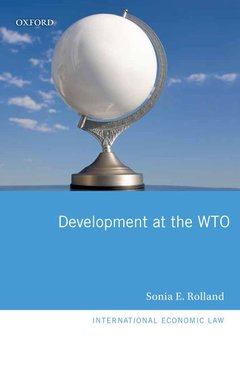Development at the WTO International Economic Law Series
Langue : Anglais
Auteur : Rolland Sonia E.

Seeking to open paths for reconsidering the trade and development relationship at the WTO, this book takes into account both the heritage of the trade regime and its present dynamics. It argues that the institutional processes for creating and implementing trade rules at the WTO and the actual regulatory outcomes are inseparable. A consideration of the development dimension at the WTO must examine both jointly. It shows that the shortcomings of the Doha Development Round are in part due to the failure to assess trade rules as part of the legal processes and institutions that produced them. This book devotes significant analysis to the systemic impact of the WTO as an institution on developing and least developed members. From a pragmatic perspective, it provides a coherent and systematic analysis of the legal meaning, the implementation, and the adjudication of special and differential treatment rules for developing members. It then evaluates the different regulatory approaches to trade and development from a more theoretical perspective. The book finishes by presenting a range of proposals for a better balance between trade liberalization and the development needs of many WTO members.
Introduction. PART 1: Development and its Institutions in International Economic Law: Who Decides what Development Means?. 1. The Multiple Meanings of Development. 2. The Contribution of International Organizations to Development Policy-Making. PART 2: Framing Development at the GATT and WTO. 3. The Trade and Development Relationship during the GATT years and the Genesis of the WTO. 4. alt,"Developing memberagt," and LDC status at the GATT and WTO: Self-Designation versus the politics of accession. 5. From the Uruguay Round to the Doha Round: The rise of developing countries' participation in the WTO. PART 3: Understanding and Contextualizing WTO Development Provisions. 6. Special and Differential Treatment in the WTO Agreements: A legal analysis. 7. Invoking Development in Dispute Settlement. 8. Reconsidering SDT in the global context. 9. Institutional processes: What impact on developing members?. PART 4: Rethinking the Trade and Development Relationship at the WTO. 10. The Doha Round: Chronicle of a death foretold. 11. Strategic challenges to integrating development at the WTO. 12. Proposals for reform. Conclusion.
Sonia Rolland conducts research and teaches at Northeastern University School of Law, Boston (USA). Her work focuses on public international law and trade law, and is informed by regular exchanges with delegates and members of the WTO community. She has practiced law in Washington DC and has clerked at the International Court of Justice (The Hague). She earned a Ph.D. from the University of Cambridge (UK), a J.D. degree from the University of Michigan (USA), an M.A. from the Université Paris 10-Nanterre (France) and the `iplôme of the Institut d'Etudes Politiques de Paris (France).
Developing countries maintain that their right to development is fundamental to today's global governance. But what does it mean? Congratulations to Sonia Rolland who, with this book, successfully meets the challenge of exploring how development is actually operationalized in the WTO.
Date de parution : 02-2012
Ouvrage de 398 p.
16.3x24.1 cm
© 2024 LAVOISIER S.A.S.



